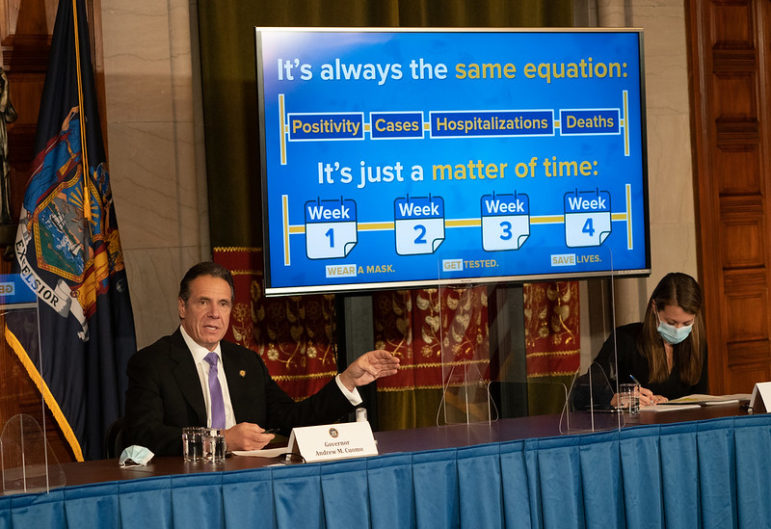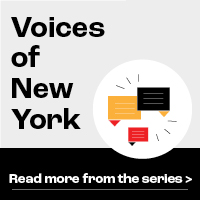Infection numbers are rising in the state prison system. But some inmates facing short sentences and bearing high health risks are still inside.

Don Pollard/Office of Governor Andrew M. Cuomo
Governor Cuomo provides a coronavirus update from the Red Room at the State Capitol. His COVID-19 policies have led to the release of 8,000 nonviolent offenders.This article originally appeared in El Diario
Translated and condensed by Carlos Rodriguez
Jorge Santiago is afraid to die before being free again. He is afraid of dying and never seeing his 29-year-old daughter Suleika again, or his wife, Brenda Negrón, with whom he exchanged vows in the summer of 1998. His fear only grows with the news of the accelerated spread of COVID-19 registered in the state of New York this month, where the positivity rate has surpassed 5 percent, 3,000 have been hospitalized, and dozens are killed every day.
The 58-year-old Puerto Rico native, who is serving a three-to-six-year sentence at the Wallkill prison upstate for stealing a car, suffers from asthma. He takes his daily medication through albuterol, fluticasone and salmeterol inhalers. Due to Santiago’s age and his other health conditions, he is in the high-risk category established by the CDC and other medical authorities should he fall ill with COVID-19.
The prison’s population of 325 inmates, of whom 69 have tested positive for the coronavirus, makes it difficult to strictly follow social-distancing protocols. Santiago is plagued by fear of catching the disease, ending up in intensive care, and joining the list of 18 inmates in New York State who have died of COVID-19.
Santiago qualifies for the state’s Early Release program, created to free non-violent felony offenders who have not been convicted of sex offenses and have less than 90 days to serve in their sentence. He also meets the Department of Corrections and Community Supervision’s (DOCCS) requirement of having a place to live that is not a shelter or a Department of Social Services residence upon his release. In his case, Santiago is scheduled to be freed on probation on Jan. 22.
Even though he qualifies and could have been released on Oct. 23, the former construction and roofing worker remains behind bars. Santiago defends his good behavior in prison, where he works for Corcraft – the DOCCS’s Division of Correctional Industries – manufacturing eyeglass lenses for the prison population and Medicaid beneficiaries across the state.
Santiago is sick, depressed and anxious. His attorney and family say that they have not received an answer explaining why he has not been given his freedom despite his vulnerable condition and the orders issued by the Cuomo Administration.
Legal Aid Society attorney Rachel Pecker, who represents Santiago, said that it is unfair for the inmate’s life to be put at risk by keeping him in jail as COVID cases increase among the penal population in New York. She added that Santiago is well-behaved and fulfills the minimum requirements for early release.
Records show that 1,808 inmates and 1,823 correctional staff have tested positive for COVID-19, representing almost 5 percent of the penal population. The emergence of 101 new cases in recent days shows a rapid spread of the virus.
At the Wallkill prison, where Santiago is jailed, 15.4 percent of the population has caught COVID-19, a higher rate than many of New York’s hotspots.
In addition to severe asthma, Santiago suffers from arthritis in his legs, and still endures the impact of a work accident he had the same month he was arrested, in which he fractured his ankle and ribs. He currently walks with a cane.
“His record qualifies him for the early release program authorizing some inmates to leave prison and be at home, not just so they can protect themselves from COVID, but to make jails safer as well, and avoid putting prisoners, staff and guards at risk,” said Pecker. The lawyer added that another advantage in Santiago’s case is that the Board of Parole granted him “merit time,” bringing forward his release by six months for good conduct.
“Because of COVID, he also became eligible for early release by 90 days thanks to Cuomo’s plan… Many people would not qualify for merit time even if they wanted to due to the lack of programs and inability to fulfill the requirements. The fact that [Santiago] earned merit time speaks very well of him,” said the attorney, adding that corrections authorities and the Cuomo Administration have offered no explanation for the delay in granting her client early release, which they created for inmates like Santiago in the midst of the pandemic.
“We sent the application by email, but we have yet to be given a reason as to why he has not been granted his freedom. We do not know what is going on, and all we are asking for is for Cuomo to do what he said he would,” said Pecker. “There is no transparency or clarity, and that is killing his family as well, who are constantly in fear of receiving terrible news.”
Brenda Negrón, Santiago’s wife of 22 years, implored Cuomo to immediately release not just her husband but all vulnerable inmates.
“Every day that goes by is another day at risk of death and anguish. I have no peace of mind and no joy at this time. There is too much going on at that place. I have anxiety, my nerves are shattered, and I am horrified to think that someone may call me to tell me he died of COVID,” said Negrón, also Puerto Rican, who lives in The Bronx with her 87-year-old mother.
“I ask Governor Cuomo to keep his promise. It’s as if we didn’t matter to him. I spoke to my husband recently, and he said that he did not feel well, that he is feeling ill. If they do not release him, he is going to die on me,” she added.
The Legal Aid Society criticized Cuomo and the DOCCS for failing to immediately release vulnerable inmates who qualify for early release. The organization asked them to free Santiago at once, as well as three other clients: Tanaile Jones, a 38-year-old transgender woman who has AIDS; J.P., a 27-year-old man with HIV; and Richard Ramos, 56. They are all eligible for early release.
“Governor Cuomo and the DOCCS must immediately make good on Albany’s promise to free incarcerated, vulnerable New Yorkers who qualify for early release, including specific clients that Legal Aid has identified as eligible, so they can return to their families and communities,” said Ted Hausman, supervising attorney at The Legal Aid Society’s Criminal Appeals Bureau.
Non-profit New Yorkers United for Justice (NYUJ) also called on the Cuomo Administration to find ways to stop the spread of COVID-19 in prisons, and condemned the fact that inmates have not been tested on a more massive scale despite the alarming contagion rates.
“In spite of the clear signs of a resurgence of COVID-19 cases across the state, the DOCCS persists in its failed mission to contain COVID-19, while it is dangerously close to having performed less than the minimum testing required,” said Alexander Horwitz, executive director of NYUJ. “The fact that no new testing has been done in any of the facilities in the last two weeks only shows the DOCCS’s dangerous, ongoing inaction regarding the impact of COVID-19 on incarcerated New Yorkers.”
Tina Luongo, attorney-in-charge of the Criminal Defense Practice at The Legal Aid Society, pointed out that the spike in COVID cases in prisons demonstrates that the Department of Corrections has not been able to control the situation, and demanded that they take action to ensure the health and survival of inmates.
“With each new case comes additional confirmation that the DOCCS is unable to contain this virus,” said the attorney. “Some 2,000 incarcerated New Yorkers have already been infected with the virus in DOCCS facilities. Instead of releasing enough people to enable social distancing in prisons, the state has ignored hundreds and hundreds of requests for early release. This is matter of life and death.”
Assembly Member David Weprin, chair of the New York State Assembly’s Correction Committee, also spoke in favor of releasing the most vulnerable inmates who qualify and who have not been convicted of violent crimes. While he stressed the need for more testing, he defended the work that the Cuomo Administration has been carrying out.
“I undoubtedly support freeing vulnerable inmates who are more exposed to COVID, particularly now when we are seeing new outbreaks in prisons as well. However, I do not think that Governor Cuomo is failing in his attempt. Many inmates have already been released to avoid putting their lives and that of others in danger,” said the legislator.










3 thoughts on “Non-Violent Offenders Remain Exposed to COVID-19 Despite Qualifying for Release”
This is true my husband is one if these people as well be should have been released and is still sitting there waiting there. Nothing is being done about it. They are doing nothing to help and just ignoring the fact that they are humans too. I find it very inhumane.
They have non violent crimes and they are not a threat to society yet the local and state jails have taken away all the rights they have no visit. Limited phone calls and they are confirmed to their cells like they are the ones bring covid into the jails. It is the workers from the outside contractors etc that are. You say on the news that you don’t want us to travel and to avoid the spread to social distance etc. The government care about the civilian population but not the inmate population.
Again they are people to. If they qualify send them home.
Please.
Have a heart
My name is Darren Hightower I’ get sentenced may 5 2021 I have been exposed to COVID my mother died from COVID I have documents by my doctor that I’m diagnosed as pot acute COVID 19 syndrome my doctor have me going to these appointments to check my heart my lungs for shortness a breast I have high blood pressure I’m nonviolent felony offender I was bought up on cocain charges I live in Syracuse New York I’m asking to save my life through to COVID pandemic
My husband has chronic asthma and theyre about to give him 6 years for a non violent crime!! He is 31 years old and has no other felonies. This shit is rediculous!!! There has to be some other way!!! When my husband gets sentenced it will be our last time seeing eachother because he will not make it home 💔💔 knowing we only have 7 days left until then kills us everyday. People should not have to live like this.